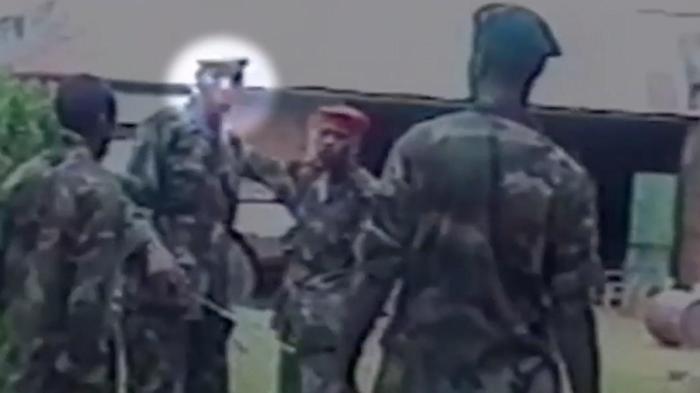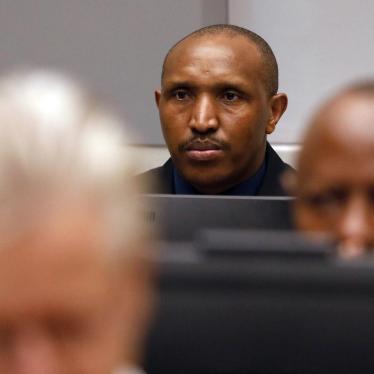
(The Hague) – The International Criminal Court’s (ICC) conviction of the Congolese rebel leader Bosco Ntaganda sends a strong message that justice may await those responsible for grave crimes in the Democratic Republic of Congo, Human Rights Watch said today.
On July 8, 2019, a panel of three judges unanimously found Ntaganda guilty of 13 counts of war crimes and 5 counts of crimes against humanity committed in Ituri, eastern Congo, in 2002 and 2003. The charges included murder and attempted murder, rape, sexual slavery, attacking civilians, pillaging, displacement of civilians, attacking protected objects, and recruiting and using child soldiers. The judges found that Ntaganda and others agreed on a common plan to attack and drive the ethnic Lendu population out of Ituri through the commission of crimes. Human Rights Watch issued a question-and-answer document on Ntaganda’s trial.
“The long-awaited judgment provides an important measure of justice for Bosco Ntaganda’s victims and puts others responsible for grave crimes on notice,” said Maria Elena Vignoli, international justice counsel at Human Rights Watch. “But renewed violence in eastern Congo highlights the need to address the impunity for other abusive leaders.”
The resurgence of violence in Ituri since early June has left scores dead and displaced more than 300,000 people.
During earlier fighting in Ituri, Ntaganda was chief of military operations of the Union of Congolese Patriots (Union des patriotes congolais, UPC), a predominantly ethnic Hema armed group. The UPC was led by Thomas Lubanga, who was convicted by the ICC in 2012 for using child soldiers. Between 2002 and 2005, forces under Ntaganda’s command were implicated in many serious crimes, including ethnic massacres, torture, rape, and the widespread recruitment of children, some as young as seven. The ICC issued two arrest warrants against Ntaganda, one in 2006 and one in 2012. Ntaganda surrendered to the United States embassy in Kigali, Rwanda in March 2013.
If upheld on appeal, the case could become the first final conviction at the ICC for crimes of sexual violence, including against men. In addition to crimes against Lendu, the court found Ntaganda guilty of the war crimes of rape and sexual slavery against members of the UPC. This is the first time the ICC has convicted a commander for sexual violence offenses committed by his troops against other members of the same force.
Human Rights Watch documented ethnic massacres, killings, rape, torture, and recruitment of child soldiers by troops under Ntaganda’s command in the Kivus, and called for these charges to be added to his case at the ICC. However, his trial, which began in September 2015 and concluded in August 2018, only dealt with crimes related to the Ituri conflict.
In May 2019, Ntaganda filed a request to disqualify Judge Kuniko Ozaki, who in early 2019 briefly acted as Japanese ambassador to Estonia while still serving on the Ntaganda case. Ntaganda’s lawyers argued that the appearance of her judicial independence and impartiality had been compromised. In June 2019, a plenary of judges rejected the request, finding that the circumstances of Judge Ozaki’s tenure as ambassador did not disqualify her.
The court will schedule hearings in the coming weeks to determine Ntaganda’s sentence and reparations for victims. It should take all necessary steps to ensure that affected communities in Congo learn about the judgment and next steps, including participating in the reparations proceedings, Human Rights Watch said.
Ntaganda was the fourth person the ICC prosecuted for grave crimes in Congo. A fifth ICC arrest warrant is pending against Gen. Sylvestre Mudacumura, the military leader of a largely Rwandan Hutu armed group active in Congo, the Democratic Forces for the Liberation of Rwanda (FDLR). Congolese authorities, with the help of United Nations peacekeepers, should act urgently to arrest Mudacumura and surrender him to the ICC, Human Rights Watch said.
The number and stature of Congo-related cases before the ICC have not addressed the scale of the crimes committed in the country since 2002, when the court’s jurisdiction started. Human Rights Watch has repeatedly urged the ICC prosecutor to expand the investigation in Congo to include, for example, the role of senior political and military officials from Congo, Rwanda, and Uganda who supported, armed, and financed abusive armed groups in eastern Congo over the years, as well as other crimes, including those committed in the attacks that began in Beni, North Kivu, in October 2014.
The ICC prosecutor should formulate a clear strategy to address outstanding accountability needs in Congo, including by supporting Congolese authorities. This will help reinforce the rule of law and address Congo’s recurrent cycles of violence. The court, in turn, needs strong long-term support from ICC member countries, which should allocate sufficient resources to meaningfully address the court’s growing workload, Human Rights Watch said.
“The verdict against Ntaganda is important, but thousands of victims of atrocity crimes in Congo still await justice,” Vignoli said. “The ICC and Congolese authorities should work together to bring to trial many more of those responsible for grave crimes, including senior officials.”
Timeline on Bosco Ntaganda:
|
1973 |
Born in Kinigi, Rwanda. |
|
1990 |
Joins Rwandan Patriotic Front (RPF) rebels in southern Uganda. |
|
1994 |
Fights with RPF to end the Rwandan genocide and joins the Rwandan Patriotic Army (RPA). |
|
1996 |
First Congo War begins - participates on the side of the RPA/Alliance of Democratic Forces for the Liberation of Congo (AFDL). |
|
1997 |
Joins the Congolese army. |
|
1998 |
Second Congo War begins - joins the Rwandan backed Rally for Congolese Democracy (RCD) rebels in Goma. |
|
1999 |
RCD splits. Joins the RCD-K-ML splinter faction in Kisangani. |
|
1999/2000 |
Moves to Bunia, Ituri district, with the RCD-K-ML rebels. |
|
2002 |
RCD-K-ML splinters. Joins the Union of Congolese Patriots (UPC) rebels. |
|
2005 |
Joins the Revolutionary Movement of Congo (MRC) rebels, but the militia group is short-lived. |
|
Nov 2005 |
Placed on UN sanctions list for violating arms embargo. |
|
2005/2006 |
Joins the National Congress for the Defense of the People (CNDP) rebels and moves to Masisi, North Kivu. |
|
Aug 2006 |
ICC issues sealed arrest warrant for Ntaganda for war crimes committed in Ituri. |
|
April 2008 |
ICC arrest warrant for Ntaganda is made public. |
|
Jan 2009 |
Overthrows Laurent Nkunda with the backing of Rwanda and takes over leadership of the CNDP. |
|
2009 |
Promoted to general in the Congolese army and appointed as deputy commander of military operations in eastern Congo. |
|
2011 |
Appointed acting commander of military operations. |
|
March 2012 |
Ntaganda’s co-accused, Thomas Lubanga, found guilty of war crimes at the ICC. |
|
April 2012 |
Ntaganda urges his loyalists to mutiny and desert the Congolese army, creating the March 23 Movement (M23). |
|
July 2012 |
ICC issues second arrest warrant for Ntaganda for war crimes and crimes against humanity committed in Ituri. |
|
March 2013 |
Surrenders himself to the US embassy in Kigali, Rwanda, after the M23 breaks apart, and is transferred to the ICC. |
|
February 2014 |
Confirmation of charges hearing. |
|
June 2014 |
The Pre-Trial Chamber of the ICC unanimously confirms 18 charges against Ntaganda for war crimes and crimes against humanity. |
|
September 2015 |
Trial against Ntaganda begins. |
|
August 2018 |
Trial against Ntaganda ends. |
|
July 2019 |
Convicted on all 18 counts of war crimes and crimes against humanity |







